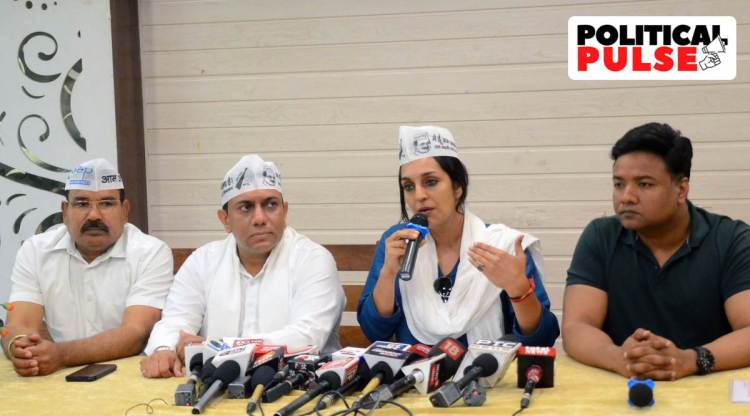 AAP leader Chitra Sarwara with other Haryana AAP leaders addressing media during press conference at Chandigarh Press Club in Sector 17 of Chandigarh. Express Photo *** Local Caption *** AAP leader Chitra Sarwara with other Haryana AAP leaders addressing media during press conference at Chandigarh Press Club in Sector 17 of Chandigarh. Express Photo
AAP leader Chitra Sarwara with other Haryana AAP leaders addressing media during press conference at Chandigarh Press Club in Sector 17 of Chandigarh. Express Photo *** Local Caption *** AAP leader Chitra Sarwara with other Haryana AAP leaders addressing media during press conference at Chandigarh Press Club in Sector 17 of Chandigarh. Express PhotoWhile the municipal elections in Haryana scheduled for June 19 are being seen as a big test for the BJP-Jannayak Janata Party (JJP), it will be an even bigger examination for the new Haryana Pradesh Congress Committee (HPCC) leadership team appointed late last month. The Opposition party also has to contend with the Aam Aadmi Party (AAP), which on the back of winning the Punjab state election, is looking at the civic polls as a testing ground ahead of the 2024 Lok Sabha and state Assembly polls.
The Congress, hampered by a weak organisational structure, has decided to contest the municipal corporation elections using its symbol (the poll date has not been announced yet) but is still undecided on the municipal committee and council polls. “We have decided that we shall be contesting the corporation elections on the party symbol,” Leader of the Opposition Bhupinder Singh Hooda told The Indian Express. “As far as the Municipal Committees are concerned, we shall be making a decision soon on whether to contest on party symbol or not.”
Former HPCC president Kumari Selja was among the state unit leaders pushing for the party to use its symbol to contest the polls. But despite conducting a membership drive last month and announcing a schedule for organisational elections, the party is weak. It has not held such internal elections for over six years.
In the last municipal elections held between 2016 and 2018, the BJP was the only national party to contest a majority of seats using its symbol. Of the 185 seats it fought in seven Municipal Corporations — Faridabad, Gurugram, Hisar, Karnal, Panipat, Rohtak, and Yamunanagar — the saffron party bagged 104 while 80 candidates won as Independents, and the Indian National Lok Dal (INLD) won one.
BJP state president Om Prakash Dhankar said the party was prepared to repeat its performance. Dhankar said he had been travelling across districts for the past few months, meeting them, and strengthening the party cadre on the ground. “Election is a festival and we shall be celebrating it with full preparations.”
Taking a dig at the Congress, he added, “There is nothing like a challenge for us in the coming polls. Rather, the Congress is suffering from its internal challenges. As far as the Aam Aadmi Party is concerned, it has not yet got cadre at the ground level.”
JJP state president Nishan Singh claimed the party was ready for the polls. JJP youth leader and Deputy Chief Minister Dushyant Chautala’s brother Digvijay said, “We are working on a seat-sharing arrangement with the BJP and will contest the polls with full strength”.
Meanwhile, the AAP has already announced it will contest all the municipal elections using its symbol. “We have already appointed observers for the municipal bodies,” said Rajya Sabha MP Sushil Gupta who is in charge of the party’s affairs in the state. For the Arvind Kejriwal-led party, this election is an opportunity to assess its organisational strength ahead of the more-important polls in 2024 and figure out if it can swing some of the votes away from the Congress.
According to State Election Commissioner Dhanpat Singh, elections on June 19 will be held for 888 wards in the municipal committees and councils. Of these, 107 are reserved for Scheduled Castes (SC), 73 for SC women, and 239 for women. The elections were scheduled for 2021 but could not be held in time because of the Covid-19 pandemic and later due to a civil writ petition filed in the High Court.
As per State Election Commission data, a majority of those who won the 2016-’18 municipal body elections were businessmen. Among elected candidates in municipal corporations, the percentage of businessmen was 42.7 per cent while in municipal councils it was 31.1 per cent. Businessmen were followed by homemakers (28.1 per cent in corporations and 38.7 per cent in councils.



